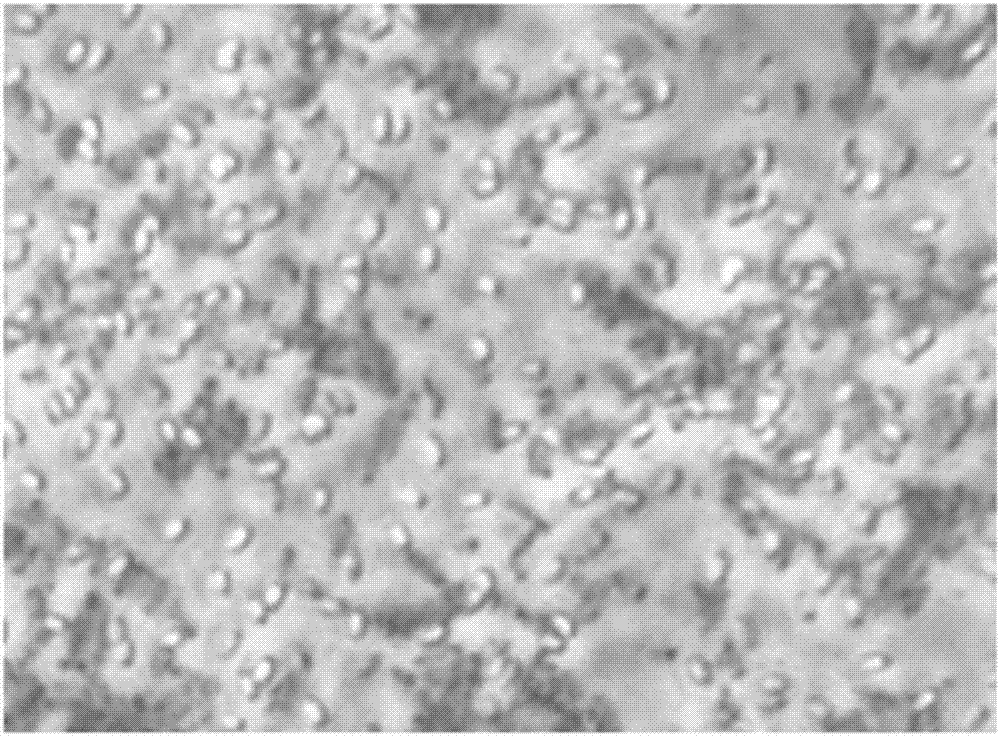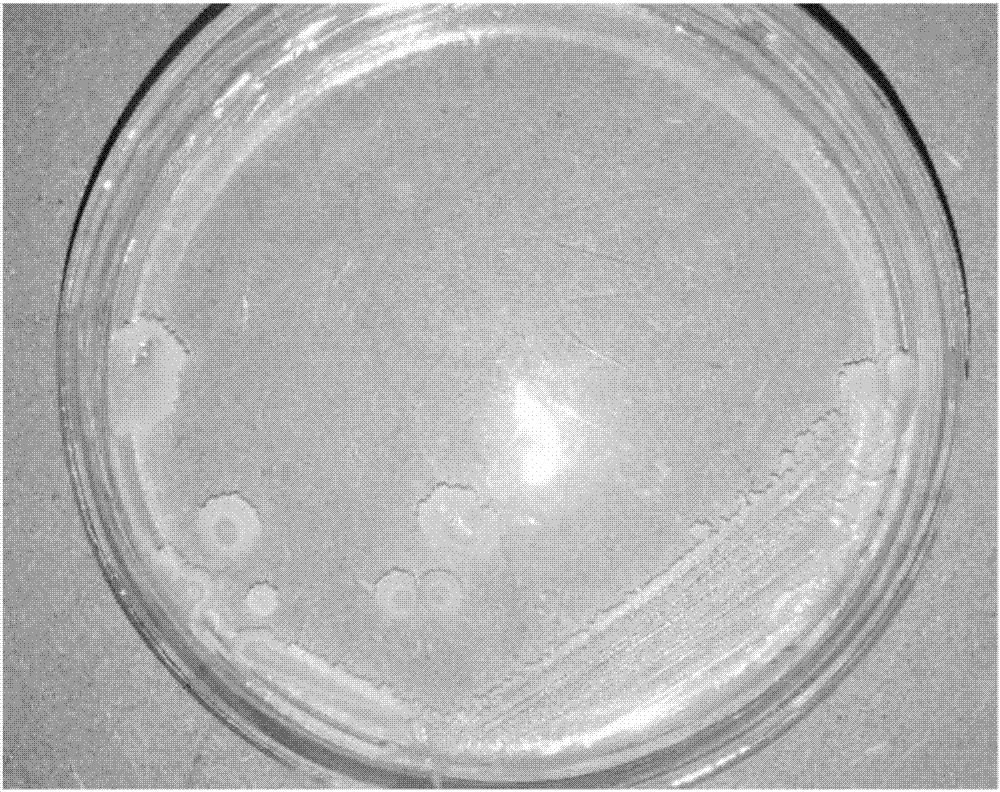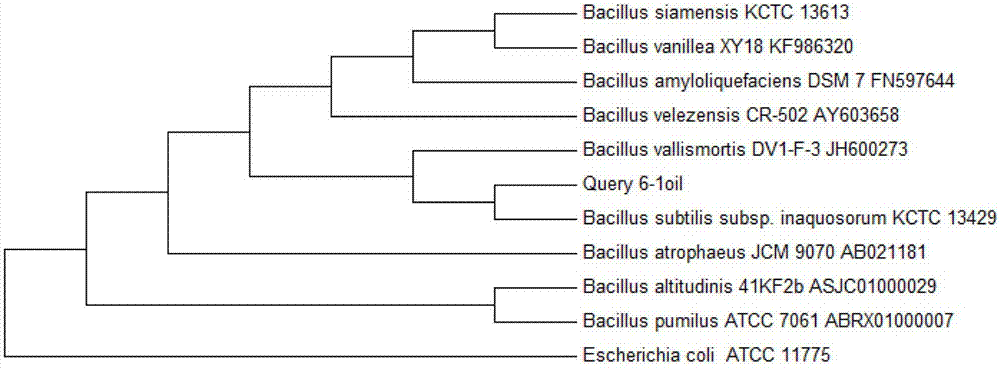Bacillus subtilis for effectively degrading grease and application thereof
A technology of Bacillus subtilis and Bacillus coagulans, which is applied to Bacillus subtilis and its application in aerobic composting of kitchen waste, can solve the problems of inconvenience in the field and incomparable benefits, and achieves avoiding the decline of microbial activity and efficient degradation. Grease, the effect of reducing the oil content
- Summary
- Abstract
- Description
- Claims
- Application Information
AI Technical Summary
Problems solved by technology
Method used
Image
Examples
Embodiment 1
[0039] This example is the isolation, domestication and identification of Bacillus subtilis strain 6-1oil.
[0040] (1) Take 1 g of aerobically fermented food waste compost and dissolve it in 20 mL of sterile water. After fully shaking and dissolving, inoculate the supernatant into the nutrient broth medium according to 5% inoculum size, place it on a shaker, and Cultivate at 37°C and 180 rpm for 48 hours to obtain a culture solution;
[0041] (2) Take the culture solution in step (1) and dilute it until the bacterial solution concentration is 500~1500cfu / mL and spread it on the culture medium containing 1% edible oil (recipe: peptone 10g, beef extract 5g, NaCl 5g, edible oil 10mL, Tween 80 1.5-3mL, agar 15-20g, water up to 1L, pH 7.0-7.4), at a temperature of 37°C, cultivate and screen out a single colony that grows;
[0042] (3) Get the single bacterium colony in the step (2) and inoculate in the liquid culture medium that contains 5% edible oil, cultivate at 37 ℃, 5 days a...
Embodiment 2
[0052] This example is an experiment in which unacclimated Bacillus subtilis and Bacillus subtilis 6-1oil were cultured on high-fat agar plate respectively.
[0053] Prepare solid medium containing edible oil (recipe: peptone 10g, yeast extract 5g, sodium chloride 10g, agar powder 15g, edible oil 50mL, Tween-80 2mL, water up to 1L, pH7.0~7.4), plate Drill holes on top, inoculate unacclimated Bacillus subtilis and Bacillus subtilis 6-1oil respectively, culture them at 37°C, and observe their growth.
[0054] For the growth of the two strains, see Figure 4 ,in Figure 4 The upper and lower holes in the middle are inoculated with unacclimated Bacillus subtilis, and the left and right holes are inoculated with Bacillus subtilis 6-1oil. Depend on Figure 4 It can be seen that Bacillus subtilis 6-1oil grows rapidly on the plate containing edible oil, with a large colony area and surrounds the colonies of unacclimated Bacillus subtilis, indicating that 6-1oil can grow well under ...
Embodiment 3
[0056] This example is a high-fat nutrient solution fermentation experiment
[0057] Inoculate the strain Bacillus subtilis 6-1oil into sterilized oil-containing liquid medium (recipe: peptone 10g, beef extract 5g, sodium chloride 5g, edible oil 10mL, Tween-80 1.5mL, water up to 1L, pH 7.0 ~7.4), cultured on a shaker at 37°C, cultured for 3 days, and observed the results.
[0058] Figure 5A Picture before inoculation of Bacillus subtilis 6-1oil culture for oily liquid medium, courtesy of Figure 5A It can be seen that before the inoculation of bacterial strain Bacillus subtilis 6-1oil, the oily liquid culture medium is yellow, and there is a layer of oil floating on it, and there is a more obvious layering phenomenon, and there is grease attachment on the bottle wall.
[0059] After cultivating for 3 days, the emulsified degradation of the oily liquid medium inoculated with Bacillus subtilis 6-1oil is as follows: Figure 5B shown. Depend on Figure 5B It can be seen that...
PUM
 Login to View More
Login to View More Abstract
Description
Claims
Application Information
 Login to View More
Login to View More - R&D
- Intellectual Property
- Life Sciences
- Materials
- Tech Scout
- Unparalleled Data Quality
- Higher Quality Content
- 60% Fewer Hallucinations
Browse by: Latest US Patents, China's latest patents, Technical Efficacy Thesaurus, Application Domain, Technology Topic, Popular Technical Reports.
© 2025 PatSnap. All rights reserved.Legal|Privacy policy|Modern Slavery Act Transparency Statement|Sitemap|About US| Contact US: help@patsnap.com



